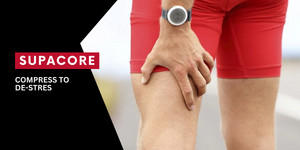Here at Supacore we’re committed to helping people affected by hip, groin, and pelvic injury to reduce their pain and get back to doing what they love sooner.
 Characterized by chronic groin pain, Osteitis Pubis (OP ) and groin issues predominantly occur in sports where athletes engage in kicking, rapid changing of direction and stopping and starting at speed. According to Pizzari, Coburn & Crow (2008), a key factor in preventing Osteitis Pubis is ensuring pelvic integrity - where the pelvis is correctly aligned, equally strong on both sides, and that there is neither too much or too little movement in the hip and sacroiliac joint.
Characterized by chronic groin pain, Osteitis Pubis (OP ) and groin issues predominantly occur in sports where athletes engage in kicking, rapid changing of direction and stopping and starting at speed. According to Pizzari, Coburn & Crow (2008), a key factor in preventing Osteitis Pubis is ensuring pelvic integrity - where the pelvis is correctly aligned, equally strong on both sides, and that there is neither too much or too little movement in the hip and sacroiliac joint.
So here are our top 3 tips to help you reduce your risk of recurring Osteitis Pubis, and groin and hip injuries:
Disclaimer: Please note that reading tips online should not replace getting advice from a medical professional. Although this exercise list is provided by a physiotherapist, it does not take into consideration your fitness or injury level. This information is not intended to diagnose, treat, or cure disease as a stand-alone document.
Increase your pelvic stability:
As outlined above, pelvic stability is one of the key aspects of prevention and recovery from any type of hip, hamstring, groin, or lower back issue. The muscles in and around the pelvis and hips can perform the following movements – each of which can be strengthened with the following exercises:
|
Flexion |
Extension |
Abduction |
Adduction |
Internal Rotation |
External Rotation |
|
Cable Hip Flexion |
Cable Hip Extension |
Cable Hip Abductors |
Cable Hip Adductors |
Cable Prone Internal Rotations |
Cable Exeternal Rotations |
|
Leg Extension |
Supine Hip Extension |
Side Lying hip abduction |
Ball Squeeze |
Windscreen Wipers |
Lying bilateral Theraband Clams |
|
Squats |
Lunges |
Single Leg Squat |
Side-lying adduction |
|
Side lying clams |
|
|
Straight back rows |
|
Copenhagen adductor exercise |
|
Windscreen wipers with ankle weight |
Compress to de-stress:
In a study by Sawle, Freeman & Marsden (2016), the researchers found that the majority of athletes in the study (who were chosen due to their pre-existing Osteitis Pubis, groin, or hip injuries) were able to apply more force to the resisted adduction with less pain, had less pain on the single leg raise test on their affected side, had less pain at rest, and less pain pre and post jump test. Their conclusions were that compression shorts that provide support around the waist (such as that found in Supacore CORETECH®) may result in subjective and objective improvements in pain and function in athletes with long-standing pelvic/groin pain. Basically - wearing these will reduce your OP pain and help with better movement and return to exercise.
Assess and Re-assess:
 Making sure you’re visiting your physiotherapist or sports medicine professional for maintenance is an absolute must when you’re dealing with chronic injury. If you’ve started exercising again and you want to make sure that you’re not going to re-injure yourself, your sports medicine professional will be able to conduct regular orthopaedic testing for function and strength on your affected joints and muscles. As we’ve said previously, pelvic stability is a huge focus when looking at these types of injuries, and the more that you’re assessing and re-assessing, the surer you’ll be that you’re ready to return to play with the lowest possible re-injury risk.
Making sure you’re visiting your physiotherapist or sports medicine professional for maintenance is an absolute must when you’re dealing with chronic injury. If you’ve started exercising again and you want to make sure that you’re not going to re-injure yourself, your sports medicine professional will be able to conduct regular orthopaedic testing for function and strength on your affected joints and muscles. As we’ve said previously, pelvic stability is a huge focus when looking at these types of injuries, and the more that you’re assessing and re-assessing, the surer you’ll be that you’re ready to return to play with the lowest possible re-injury risk.
Making sure you’re visiting your physiotherapist or sports medicine professional for maintenance is an absolute must when you’re dealing with chronic injury. If you’ve started exercising again and you want to make sure that you’re not going to re-injure yourself, your sports medicine professional will be able to conduct regular orthopaedic testing for function and strength on your affected joints and muscles. As we’ve said previously, pelvic stability is a huge focus when looking at these types of injuries, and the more that you’re assessing and re-assessing, the surer you’ll be that you’re ready to return to play with the lowest possible re-injury risk.
PURCHASE YOUR SUPACORE PRODUCT NOW
|
|
References:
Pizzari, T, Coburn, P & Crow, J 2008, "Prevention and management of osteitis pubis in the Australian Football League: A qualitative analysis", Physical Therapy in Sport, vol. 9, no. 3, pp. 117-125.
Sawle, L, Freeman, J & Marsden, J 2016, "The Use of a Dynamic Elastomeric Fabric Orthosis in Supporting the Management of Athletic Pelvic and Groin Injury", Journal of Sport Rehabilitation, vol. 25, no. 2, pp. 101-110.


